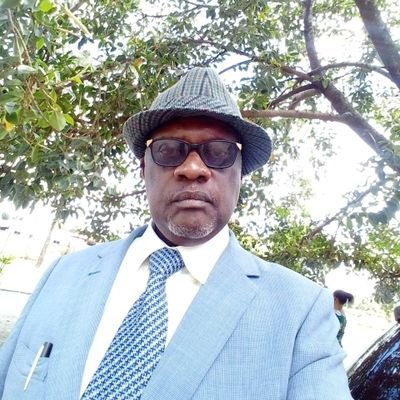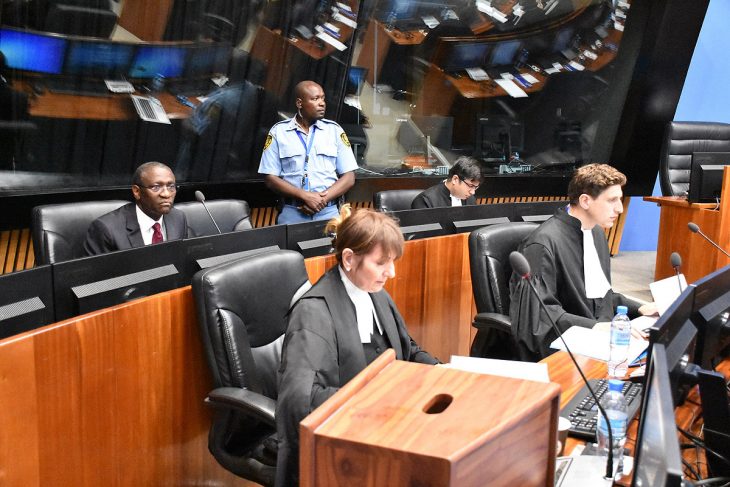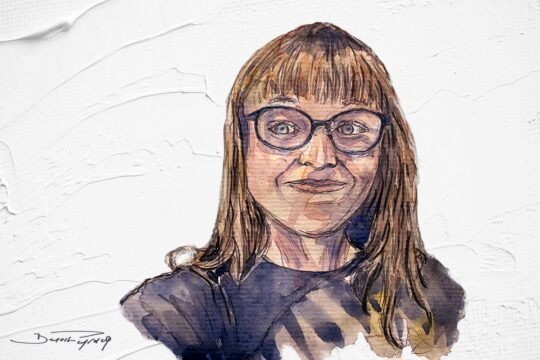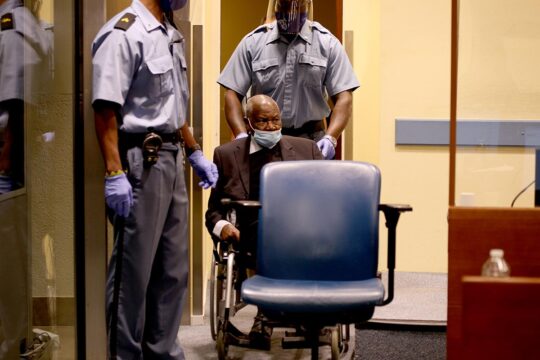No one, and especially not the witnesses, come out looking good after these ten days of sinister accusations in the twilight atmosphere of the "residual mechanism", whose building is nevertheless brand new.
On Friday, September 27, the Mechanism for International Criminal Tribunals (MICT), at its Arusha branch in northern Tanzania, was preparing to issue a decision for its first review trial. In the small circular room the two parties faced each other, separated by three members of the Registry. In the public gallery, a few people were waiting. Augustin Ngirabatware chose to be absent for the reading of the judgment. He was represented by his British lawyers Diana Ellis and Sam Blom-Cooper.
The five judges of the Appeals Chamber entered the courtroom. In the centre is presiding judge Theodor Meron, who once angered Kigali by granting early release to several former convicts of the International Criminal Tribunal for Rwanda (ICTR). But this Friday, we already knew there was no risk of controversy. The American octogenarian had already said three days earlier that the Appeals Chamber did not consider that Ngirabatware had presented “sufficient evidence to establish new facts”. And so it was no surprise when Judge Meron announced in the late morning of October 27: "The Chamber unanimously decides that the judgment remains in force in all respects.”
Accusations of lying…
The application for review was based on the retraction of four prosecution witnesses, whose testimony had a significant impact on the former minister's conviction. They had signed letters of retraction, which convinced the Appeals Chamber to open a new review trial. According to the defence, the four witnesses admitted to "lying" at the first trial, either because of promises of benefits as prisoners sentenced in Rwanda for genocide, or because of pressure and intimidation. One of them, whose identity was protected by the Court under the pseudonym "Anat", had been sentenced to death in Rwanda. But, as the witness recounted when returning to the witness stand on September 16, his sentence was commuted and he was later released after his "false testimony" against Ngirabatware. A second witness, "Anan", was also said to have been released in exchange for his testimony against the former minister. Before agreeing to "memorize" charges against Ngirabatware, he was deprived of food and beaten up in prison, according to the defence.
… and allegations of bribery
The case is not so simple, the prosecutor retorted: the written retractions of these witnesses were the result of bribes paid by Ngirabatware supporters, including a certain Anselme Nzabonimpa, currently on trial before the Mechanism with four other Rwandans for contempt of court in the Ngirabatware case. But Ellis described her client’s witnesses as "honest people who did not deny they received some money to support themselves, one being unemployed, the other having to repair his house that was destroyed". They received this small amount, she said, long after deciding to retract out of a "guilty conscience" for getting an innocent person convicted.
But the defence case took a blow when the two other witnesses who produced written retractions, "Anam" and "Anae", disavowed their retractions at the hearing. "I have never made a false statement. I am telling you that the statement I made in 2010 remains. I don't add anything to it, nor do I take anything out of it," said Anam, taking the British lawyer by surprise. So what about the letters of retraction? She replied that she was not the author and that she only signed them under pressure and intimidation. The defence had no better luck with the witness "Anae". "My statement in 2010 was true and I maintain it (...) Everything about my retraction was imposed on me".
When were they corrupted?
Ellis, who called the two ladies to the stand, then asked the judges to examine their credibility. She said they should not be recognized as credible, either in their statements in the first trial or at any stage of the proceedings. But Judge Lee Muthoga wondered how one could find two witnesses credible and not believe the other two, when all four received money. In the public gallery, people were wondering were the witnesses corrupted before or after the first trial?
On September 27, Judge Meron and his four colleagues decided, not on this issue but on their credibility in the review trial. The testimony, he reads, "raises many suspicions as to their veracity and authenticity at the review hearing”. In particular, the judges consider that "the fact that the witnesses acknowledged that they received money around the time they signed their letters of retraction and in the period preceding their testimony at the review hearing casts a considerable shadow on the sincerity of their respective decisions to retract".
Talking to JusticeInfo at the end of the hearing, Ngirabatware's lead counsel Diana Ellis questioned the judges' reasoning, saying they should have examined not the circumstances of the retractions but their veracity. "The witnesses gave convincing testimony that they maintained to the end, but the Appeals Chamber ignored it," she complained. She believes that the witnesses who withdrew their retractions did so for fear of reprisals in their country, Rwanda. Finally, she claims that her client was the victim of "fabrications" and that at no point during the procedure was his important alibi taken into account.
Satisfaction in Kigali
In a statement issued after the judgment, prosecutor Serge Brammertz said he was "satisfied" that the judges had "rejected Augustin Ngirabatware's attempt to secure reversal of his convictions". He also said anyone interfering with the witnesses would be prosecuted. Satisfaction was also expressed by the Rwandan National Commission for the Fight against Genocide, which says Ngirabatware's move was based mainly on a broader plan aimed at "creating jurisprudence for the revision of other final judgments pronounced by the ICTR, and thereby undermining their legality and legitimacy".
Now that his trial is definitively closed, Ngirabatware is expected to be transferred to a country other than Tanzania to serve the remainder of his 30-year sentence. Meanwhile, the prosecutor is still looking for his stepfather, Félicien Kabuga, often presented as the financier of the genocide.






